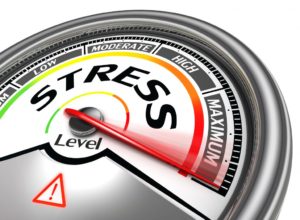The adrenal glands are small glands that sit above your kidneys, but don’t let their size fool you. They are a very important part of your body, especially when it comes to energy production and managing stress. They also work hand-in-hand with:
- Your pancreas for blood sugar regulation;
- Your thyroid for metabolism;
- Your other hormones such as progesterone, estrogen and testosterone; and
- Important brain chemicals called neurotransmitters.
If you’ve been under a lot of stress or experiencing imbalances in any of the above systems, your adrenal glands could need some TLC.
Five Warning Signs:
1. Fatigue
If you are having trouble dragging your body out of bed in the morning, suffering a mid-afternoon slump, relying on caffeine to get you through the day, or falling onto the couch in a heap after you get home from work, you are experiencing fatigue. Better do something about this now, while you can at least still drag yourself out of bed and before this fatigue becomes more chronic and severe.
Your adrenal glands produce cortisol, and normally they should be able to produce a healthy dose for you first thing in the morning, as part of a normal circadian rhythm. This high dose in the AM helps you get out of bed and take on the day.
It’s no surprise then, that the fatigue caused by adrenal gland dysfunction is especially noticeable first thing in the morning. You may also notice a significant slump in the mid-afternoon, and generally low energy throughout the day. You may also notice that after you have a busy, high-demand day, or miss a night of sleep, that you can barely function the following day.
As fatigue gets worse, you rely more and more on your thyroid gland to help you out to produce more energy. Soon this gland can get overworked as well. Thyroid dysfunction and adrenal gland fatigue are almost always seen together.
2. Trouble getting to sleep or staying asleep
It seems counterintuitive because (as mentioned in warning sign #1), you’re sapped of energy and tired most of the day. But when you finally get the chance to crawl into bed, you may find that you cannot wind down, or that you don’t get restorative sleep.
If you are like many of my patients, you feel like you are finally getting your deepest sleep right about the time your alarm clock is set to go off. After hitting snooze repetitively, it’s time to start the day and do it all over again.
Normally, cortisol levels should fall gradually throughout the day, and be nice and low at bedtime. If your cortisol level elevates in the evening, or if it spikes during the night, you won’t be able to sleep.
And here’s the Catch-22: lack of sleep puts additional stress on your system, putting even more of a burden on your adrenal glands.
3. Craving carbs and salt
When you are under stress and tired, your brain knows you need fuel so that it, and you, can function. And the fuel it craves is easy-to-digest simple carbohydrates that it can quickly use for energy.
Most patients describe to me that they don’t want anything in the morning except a cup of coffee and maybe a piece of toast or cereal. But then they have cravings and hunger throughout the day. A lack of appetite in the morning is a cardinal sign of blood sugar imbalance, and very commonly seen accompanying adrenal gland fatigue.
The cravings for salt and sugar are a compensation mechanism. Your body knows that eating will boost your cortisol levels to give you some much-needed energy and make you feel a little less dead.
The problem is that this creates a vicious cycle. The more simple carbs you eat, the more of the same you crave. Your blood sugar spikes and then plummets, and the easy, yummy pick-me-up needs to happen more and more frequently. This causes blood sugar dysregulation and insulin resistance. Excess weight comes on and won’t come off, and energy becomes non-existent without a caffeine or carb boost.
Adrenal fatigue and blood sugar imbalances like reactive hypoglycemia (low blood sugar), insulin resistance, and pre-diabetes go hand in hand.
The adrenal glands also help regulate sodium, potassium, magnesium and chloride levels in the blood through a hormone called aldosterone. If your adrenal glands are fatigued, you might not be producing enough aldosterone and will crave salt. Craving salt is a sign of mineral imbalance, and is a tell-tale sign of adrenal gland fatigue.
4. Inability to handle stress
Are you feeling like everyone and everything seems to be on your very last nerve these days? Are you baffled at how short your trigger is, and the way your body spirals into fight-or-flight mode at the drop of a hat?
Maybe one of your kids spills his oatmeal right before you’re headed out the door, or someone at work makes a joke that you don’t think is particularly appropriate. Your logical brain knows it’s probably not that big of a deal, but your body reacts automatically and immediately, sending you into full-fledged fight-or-flight mode. Your heart races, your body and hands tremble a little, your face gets flushed, and you feel like you are about to jump out of your skin. You know it’s an overreaction, but you don’t know how to stop it.
This trigger-effect usually happens when you have experienced a significant stress in the past, and your body has not been able to get back to the normal set point you once had. You are stuck in high-stress survival-mode and your nervous system is now wired to release excitatory neurotransmitters that signal a surge of cortisol to come crashing out when only a little would do the trick. This trigger-happy state is not a good or healthy place to live, for you OR your family members, friends, or co-workers. In addition, this systemic overreaction can plummet you further into the adrenal-fatigue downward spiral.
5. Decreased sex drive (libido)
When you are under constant stress, sex becomes very low on the list of priorities. This is because your system is prioritizing other functions it deems more necessary for your survival, and is in the full-time business of making cortisol whenever and however it can.
When your system runs out of raw materials to make cortisol, it starts to steal other hormone raw materials to make more cortisol. The result is that your sex hormones diminish and become imbalanced, and sex just doesn’t sound so good anymore.
If you have your hormones tested, the results may show low or imbalanced hormone levels. If you try to supply more estrogen, progesterone of testosterone hormone to your body (synthetic, natural, or bioidentical), your body will likely take these hormones, break them down and try to make cortisol out of them. This result is certainly not a long-term solution or cure, and can leave you feeling worse than ever.
Your hormone levels should be tested along with your cortisol levels so your doctor can determine if cortisol is running the show. Getting to the true cause of the problem will likely involve some type of adrenal gland support.
What Should You Do?
The key is to have the appropriate testing done. Test your adrenal glands along with your other related systems (blood sugar, hormones, neurotransmitters, for example). Nothing in your body works in a vacuum. You and your doctor need the complete picture of what your body and brain need to re-balance.
Lab testing can help determine what’s out of balance, and then Dr.Engelbart can customize a sound dietary, lifestyle, and supplement plan to help turn it around. A simple saliva test can show what cortisol is doing throughout the day, and this can be compared to how your blood sugar, other hormones and neurotransmitters (especially norepinephrine, and epinephrine) are functioning.
NOW is the time to address your adrenal fatigue and start on the road to recovery. Schedule a consult with Dr. Engelbart today.

